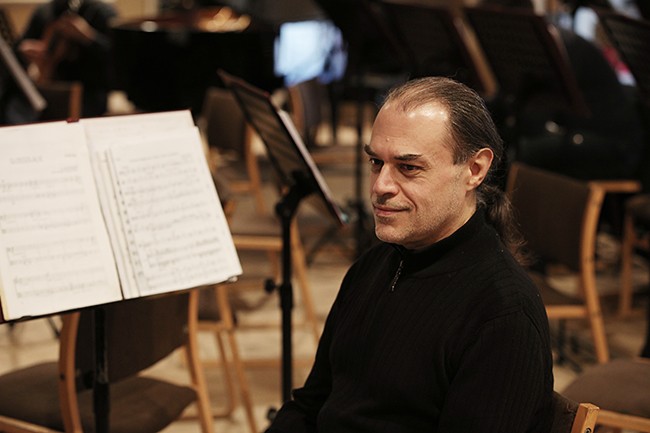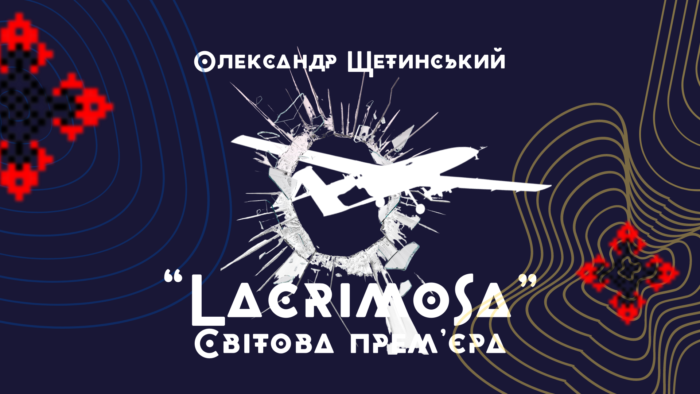Created to the sound of Russian artillery fire, Shchetynsky's musical composition Lacrimosa was written at the request of the Lviv Organ Hall. It was composed in Kyiv during the first weeks of the Russian invasion of Ukraine when the Ukrainian capital was under constant missile fire. This unique musical composition will be conducted by Ivan Ostapovych, and performed by soloist Svitlana Pozdnysheva and the Luhansk Regional Philharmonic, whose members were recently forced to leave the eastern region of Luhansk for Lviv.
Oleksandr Shchetynsky is a member of the National Union of Composers, winner of seven international composition competitions, and a prolific composer with over 150 works of different music genres. Written especially at the request of the Lviv Organ Hall, Lacrimosa reflects the musical strategy designed by Ukrainian Live Classic, a team of young music enthusiasts led by Ivan Ostapovych and Taras Demko.
Phone app brings 40 Ukrainian classical composers into your pocket
In his new work, Shchetynsky conveys his own reflections on what is happening outside his apartment, in the streets of Kyiv, and in Ukraine as a whole. His unique piece is written for an unusual musical group combining the violin, oboe, horn, two trombones, and organ.
“This exceptional composition has a history of its own, a history connected with the Luhansk Philharmonic Orchestra. In fact, the orchestra was forced to flee twice – first in 2014 after Russian forces occupied parts of Luhansk Oblast. The musicians moved to government-controlled Sievierodonetsk in Luhansk Oblast, which is now under constant Russian shelling and artillery fire. Consequently, the musicians decided to move again, from Sievierodonetsk to Lviv in western Ukraine. However, the orchestra is not complete as some members decided to stay in Sievierodonetsk. But, the musicians that we welcomed here in Lviv were willing to work with us and undertake the difficult task of interpreting Shchetynsky’s unique musical score.
Finally,this is not just someone’s artistic interpretation of the horrifying reality in Ukraine today, but an extremely powerful manifestation of an artist’s vision, his strong belief in the victory of light over darkness and evil,” says Taras Demko, director of the Ukrainian Live Classic project.

The artistic director of Ukrainian Live Classic Ivan Ostapovych explains that Lacrimosa translates from Latin as “requiem/song of mourning”. It is an important part of the Dies Irae sequence in the Roman Catholic Requiem Mass.
“Oleksandr Shchetynsky completed his work just one week ago, so we’ve been working hard to prepare for the premiere performance. I firmly believe that such events are extremely important in these times. If you’re a composer, then this is your mission - to create new meanings, to understand and convey what is happening today…
And Oleksandr Shchetynsky confirms just that. I think his Lacrimosa is a historic interpretation of today’s reality, because - despite the fact that it was written by an outstanding composer to the sounds of shelling and explosions - it gives us hope. We at Ukrainian Live Classic would like Ukrainians to hear this remarkable music and perhaps experience a kind of catharsis, feel enlightened and confident in our common future.” remarks conductor and artistic director Ivan Ostapovych.
In conclusion, both Taras Demko and Ivan Ostapovych point to an important fact, which explains why they continue working in the cultural field despite the air alerts and threats of artillery fire in their city. Every day, Russian propagandists intensify their disinformation campaign, claiming that Ukrainian culture has been tightly bound to Russian culture for centuries. Oleksandr Shchetynsky's Lacrimosa proves the opposite. Even in the difficult conditions of this brutal war, the Ukrainian cultural community - musicians, composers, artists of all walks of life - continue to create and perform.
Not only is this a manifestation of the strength and will of Ukrainian culture, but also of the Ukrainian people as a whole.
Read more:
- Ukrainians love the Turkish combat drone Bayraktar so much they wrote a song about it
- Lviv’s Forbidden Music project proves totalitarian regimes cannot control people’s minds – Swedish composer
- Ukraine launches official account on Spotify
- Ukrainian music forbidden under Soviets comes to limelight in international project
- Explosion of new Ukrainian music after introduction of protectionist language quotas
- Kyiv is becoming the world’s music video capital: 12 iconic clips
- Beyond Go_A: a playlist and guide to modern Ukrainian folk music
- The secret of Kateryna Pavlenko, Ukraine’s enigmatic Eurovision singer
- Phone app brings 40 Ukrainian classical composers into your pocket
- Why was Ukraine’s Eurovision performance by Go_A so mesmerizing?

